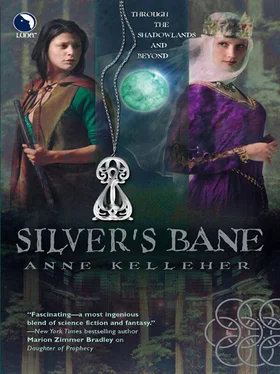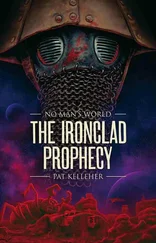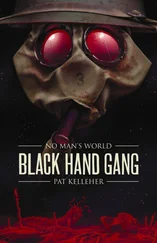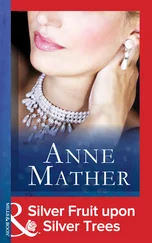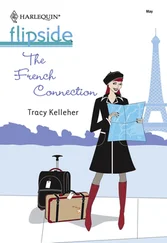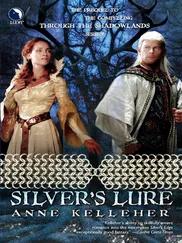“We don’t see him, sir,” answered the first to reach the perimeter.
“But it appears that every last one of them was slain. There’s no one of the entire host left, except for us?” The second soldier’s brow was drawn, his mouth tight and grim.
“We should take the lady to Her Grace,” interjected a third. “She has done her duty by bringing us to this terrible place, and we have not yet discharged ours to her.”
There was a murmur of general agreement. Delphinea met the captain’s eyes. They were gray in the shadows, lighter than the gray of his doublet, gray as the pale faces of the dead sidhe beneath the graying sky. “Who could’ve done this, Captain?”
“Mortals.” He shrugged and looked around with a deep sigh. “From what I can tell, they were all killed with silver blades. Who else can wield silver in such fashion?” In the orange torchlight, his face was yellowish and gaunt.
“But why—”
He shrugged and turned away before she could finish her sentence. The sight alone defied reason. We are all sickening, she thought. The Caul must be undone or we shall all sicken and die. She turned away silently, gathering up her riding skirts, the men following. That so many should die the true death, the final death, was terrible enough. But was it really possible that mortals—mere mortals, as the lorespinners dismissed them—could have armed themselves with silver and attacked an entire host?
So much was happening, so much was changing. Round about the circle goes, dark to light and back it flows. The old nursery song spooled out of her memory. But for the first time, she had the sense that the turning wheel of time was in danger of spinning violently out of control.
By the time they reached Petri, the dawn light had strengthened enough to show him lying curled into a heavy sleep. He had stopped making any noise at all except for long shuddering snores and his mouth hung slack over the gag. She wondered how long it would take to convince Vinaver that Finuviel did not lie dead beneath the ancient trees with the others.
For Finuviel was not dead, she was quite sure of that, in an odd way she could not at all explain. Something had happened to her last night, something had changed within her, awakened in her, in some way she did not yet fully understand but knew with absolute certainty she should trust. And she knew that Finuviel was not dead. Not yet.
But these grim guards would have to see for themselves—Vinaver would require as much proof as could be had that Finuviel was not here. She would not take Delphinea’s word for it; why should she? So Delphinea said nothing as they marched back beneath the trees and it struck her that the sound of the wind in the branches was like the lowing of the cattle on the hillsides of her homeland. What wind? Her head jerked up and around, as she realized that the air was still. The captain, ever alert, held up his hand.
“Are you all right, lady?”
The curious sound stopped. She shook her head, feeling foolish. She was only overwrought, and succumbing to the rigors of the night. Best not to call attention to it. What would her mother say to do? Smile. “I but found last night somewhat taxing.”
It was as brave an attempt as she could muster at the polished language of the Court, and no lady with a lifetime’s experience at Court could have phrased it better. Half smiles bent their mouths, but melted like spring snow. How meaningless the words sounded, brittle as the drying leaves gusting at their feet, swirling at their ankles in deepening drifts. There was simply no etiquette to deal with such a loss, which must affect the soldiers doubly hard. What stroke of chance had led Finuviel to send these six back to guard his mother’s house? But why did he think it needed special guarding? How vulnerable could it be so deep within the Old Forest of Faerie? It was leagues and leagues from the goblin-infested Wastelands. Had he suspected something? Had he known that mortals armed with silver might attack?
She felt, rather than heard, a deep throbbing moan as she passed beneath the branches of a nearly leafless giant. Its great trunk divided into two armlike branches that ended in countless outstretched skeletal hands. The Wild Hunt had swept many of the trees bare. Yet the trees of Faerie had never before been bare. Their leaves turned from gold to red to russet to brown to green in one eternal round of color, and if a few fell, new ones grew to take their place, in an endless cycle of regeneration. She thought of the dust on the floor of the Caul chamber, the rust on the hinges of the huge brass doors, of the rotting bodies of her cattle and the foals, the fouled streams. Was this just another piece of evidence that Faerie was truly dying? But she was silent as she allowed the guards to help her onto her saddle. The mare seemed fully recuperated, and tossed her head and whickered a greeting as Delphinea gathered up the reins.
Petri was slung over the back of another horse like a sack of meal. Though Delphinea protested his treatment, the horse shied and whinnied and finally a blanket had to be placed beneath the gremlin and the animal before the horse could be induced to carry him.
“I cannot imagine what circumstances brought you here on such a strange, sad night, my lady.” The captain swung into his saddle, and raised his arm in the signal for the company to ride. He rode past, stern-faced and tensed, and she realized he did not expect an answer. The milk-white horses moved like wraiths beneath the black leafless branches, as a red sun rose higher in a violet-cerulean sky. Even now, stark as it was, it was beautiful, beautiful in the intensity of its pulsing radiance. The air was crisp, but heavy, charged with portent.
They rode in grim silence another half turn of a glass. The light grew stronger and suddenly, the thick wood parted, and a most extraordinary sight rose up. Like a living wall, a latticework of high hedge grew laced between the trees, and just beyond, high above the ground, within what appeared to be a grove of ancient oaks and sturdy ashes, Delphinea saw a house that looked as if it had grown out of the trees, not been built into them.
The reins slackened in her hands as she gaped, openmouthed, at the peaked roofs, all covered in shingled bark, windows laced like spiderwebs strung between the branches. Winding stairs curved up and around the thick trunks, and tiny lanterns twinkled in and among the leaf-laden branches. There is magic yet in Faerie, she thought, and was a little comforted. Her mother’s house of light and stone was nothing like this living wonder, and even Alemandine’s palace, as beautiful as its turrets of ivory and crystal were, could not compare to this house of trees.
As if he’d heard her thoughts, Ethoniel smiled. “Indeed, my lady. The Forest House of the Lady Vinaver is a wonder in which all Faerie should delight, not shun.” He held up his hand and the company slowed their mounts to a walk all around her. He leaned over and touched her forearm. “Slowly, lady. Do you not see the danger that grows within the hedge?”
As they came closer, she saw that the hedge was full of jagged thorns, skinny as needles, some as long as her fingers, with tiny barbs at their ends which would make them doubly difficult to remove, all twined about with pale white flowers that put out such a delicate scent that Delphinea had to force herself not to push her nose into the hedge’s depths, to drink more deeply of it. She realized that the plant was nourished by the blood of things that impaled themselves upon the thorns, and from the profusion of flowers, the thickness of the vines, and the lushness of the scent, there were plenty of creatures that did. She shuddered as she rode through the narrow archway that formed the only gate, shrinking away from what was at once so beautiful, and so deadly, so tempting, and so dangerous.
Читать дальше
